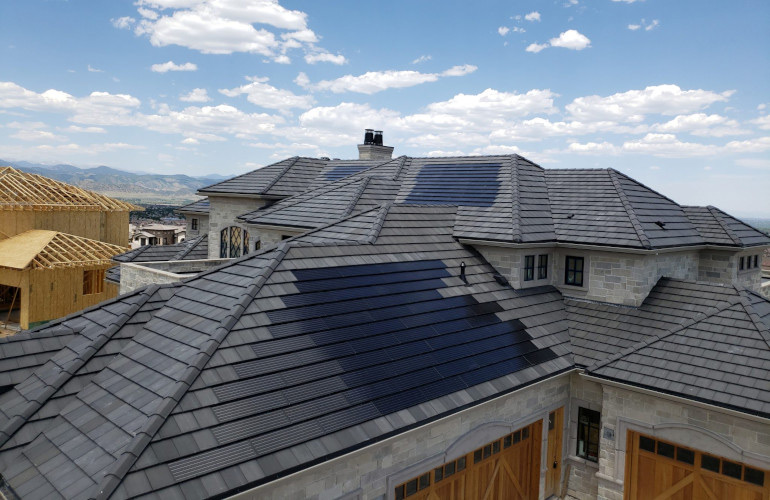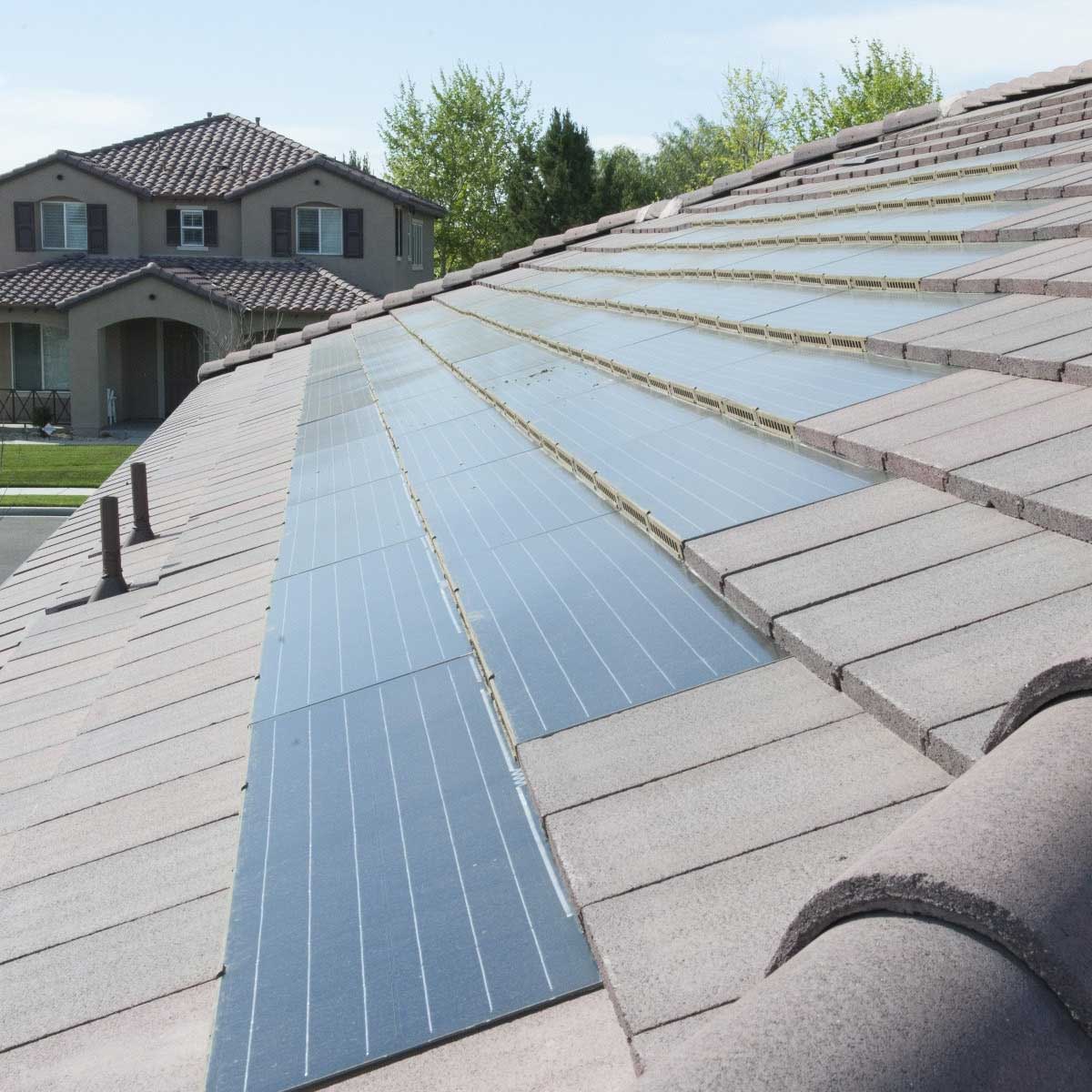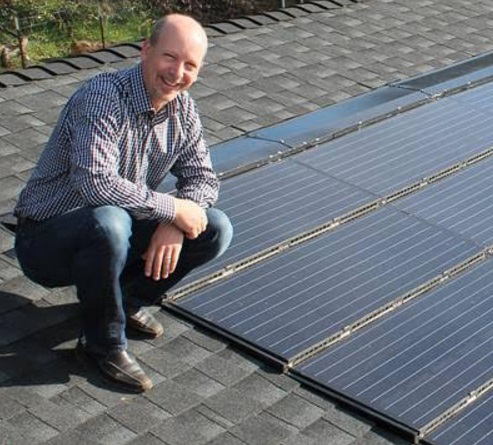In the United States, the solar tile business has always been an uphill battle – even the “leaders” CertainTeed, GAF Energy, and Tesla might agree. But New York-based SunTegra has carved out a niche in the high-end residential market and has successfully operated over the past decade, navigating through Chinese tariffs, the pandemic, and the expansion of domestic manufacturing for non-traditional solar products.
Oliver Koehler, the current CEO of SunTegra, is terminating his passion project, stating that the events of the past year have reached his final limit of patience.

Sunshine integrated solar tile
“If you don’t have the money to keep the company going, you’re just stagnating. The irony is, unfortunately, that these Chinese companies have the money,” he said. “It’s really a shame. I just want to make better-looking solar panels.”
SunTegra began producing silicon-based solar shingles and tiles in 2014. These products are fixed on roof panels in an overlapping manner and feature a patented ventilation design to reduce heat and increase energy production. The SunTegra shingle is a 2x4-foot photovoltaic panel with an injection-molded frame, boasting a peak power of 114 watts. Solar shingles are ideally installed during the construction of new homes or during roof tile replacement, which is why SunTegra has found a customer base that seeks solar shingles with superior aesthetics.
Koehler's experience at BP Solar and SunPower has made him a seasoned veteran in the industry, equipped with the advantage of success, but the challenges began immediately.
"We have been affected by tariffs since our first batch of containers were loaded onto the ship, which actually dates back to 2014," he said. "At first, we and others had suppliers in China at that time. Then we switched to Suniva solar cells from the United States because there were some brewing tariffs on Chinese-made solar products during the Obama era, which should have allowed us to bypass these tariffs. However, the Department of Commerce changed the rules at the last minute, stating that any panels coming out of China would be taxed, regardless of whether they contained American solar cells. Suddenly, we discovered this change, and we already had containers in transit.". ”
Assembling solar tiles in China using American silicon panels quickly proved impractical. Then SunTegra tried assembling in Indonesia, but logistics there were equally challenging. Therefore, Koehler turned to Mexicali, Mexico, to produce custom solar panels for SunTegra.
"We purchased some [solar tile] equipment from the soon-to-be-closed Dow Solar and transferred it to Mexico," he said. "I signed the lease contract a week before Trump began attacking the North American Free Trade Agreement, and a year later, new solar tariffs took effect, which also targeted Mexico and Canada."

A SunTegra installation
The North American Free Trade Agreement (NAFTA) established a free trade area that eliminated tariffs between Canada, Mexico, and the United States. Upon taking office in 2017, President Donald Trump initiated negotiations to replace the agreement. The subsequent discussions also influenced the solar tariff investigation, including Mexico and Canada, which at that time appeared to be excellent locations for manufacturing.
SunTegra eventually forged a relationship with Prism Solar, a small dual-panel manufacturer based in New York. Together, they assembled a small production line at Prism Solar's facility, capable of producing 5 megawatts of modules annually. However, with the advent of COVID, Prism's parent company wished to exit the manufacturing sector. The building was subsequently sold to an Internet retailer.
"We tried to purchase equipment from Prism, but the owner of the new building didn't want to manufacture there. Finding a new space was too expensive, and moving Prism's laminators would also be very costly. We had to fall back on our backup plan, which was to source laminates from Asia and perform final assembly near Buffalo, Pennsylvania," said Koehler. "We found a supplier in Vietnam who did a great job. We hoped to raise funds and try to bring manufacturing back to New York, but raising funds for domestic solar manufacturing is very difficult and slow. Then, due to Biden's directive, tariffs in Southeast Asia were postponed for two years, which began to cause problems. The initial tariffs didn't seem like the end of the world, but then they were." The increase from about 60% in December 2024 to over 200% in April 2025 trapped a container in Vietnam and cut off our income. Then, this retroactive nature simply made it unbearable for us. ”
The problem with SunTegra is not a lack of demand, but everything else. The SunTegra Shingle consists of only 24 cells, but producing a small panel still requires the same equipment as a traditional full-size panel. Large panel factories do not want to make room for niche products, and there are no custom solar manufacturers in the United States.
"You need a certain scale to reduce costs. Asia is a great place to achieve this," Koehler said. "You can find a small contract manufacturer that produces off-grid panels or garden lights. They have laminators and skilled employees, and you can obtain these panels at a reasonable price without spending a lot of money on equipment and facilities. If this is not possible, it will be difficult. If you want to do this in the United States, you need a larger investment to start, which makes raising funds more difficult."
Due to the lack of a cost-effective method to manufacture solar tiles and the uncertainty brought by Trump's fluctuating tariff policies, Koehler has become nervous about the future of SunTegra. The expiration of the residential investment tax credit at the end of this year has accelerated this process.

Oliver Kohler, CEO and Founder of SunTegra
"With the removal of tax incentives, the payback period for solar tiles has become even more unrealistic," Kohler said. "Solar tiles indeed have a place in the market, but it requires others to conquer it."
SunTegra is informing installation contractors and existing customers of its business closure. Koehler stated that a certain level of service capability will be retained to ensure answers to questions related to SunTegra installations and products. The company will eventually consider selling its intellectual property, as Koehler still believes in the design and production value of SunTegra. In the current environment, it is difficult to conduct solar tile business in the United States.
"I still think solar shingles have a lot of potential, but you worry about not having a level playing field, where people can't innovate and do new things, you can't drive down costs and build a more innovative grid. That will get done in other countries," he said. "What I'm doing here is not some breakthrough innovation. It's just a product extension, or something like that. But even that's proving too hard, not because customers don't want it, but because the government is too involved in the industry. And it's not just the U.S. government. The dumping from China is real, and that's a real problem that no administration in the U.S. has been able to address properly. But being in the cross hairs is even worse."
"Part of me deep down thinks I need to do something completely different for a while," Kohler continued. "But I still love solar energy."

 Tiếng Việtvi
Tiếng Việtvi Tiếng Việtvi
Tiếng Việtvi
 A SunTegra installation
A SunTegra installation
